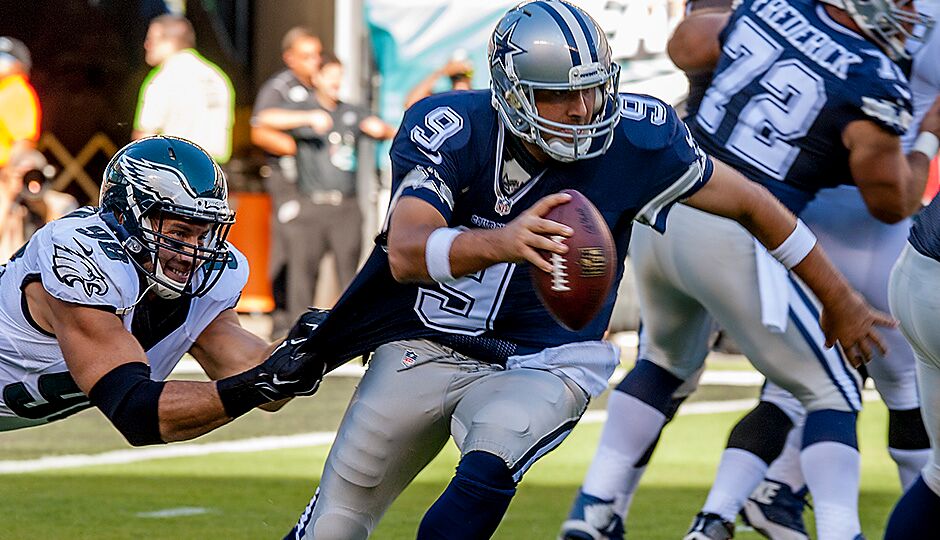Four Downs: Eagles Offense Inept In Home Opener
The Eagles lost to the Cowboys, 20-10, in their first home game of the season. Here’s what we saw.
MOST TELLING STAT: 7
DeMarco Murray was very frustrated in the first half, and it’s not difficult to understand why. The Eagles rushed for just seven yards, with Sam Bradford as the leading ball-carrier. When the running back took the handoff, he was either immediately hit or had zero running lanes. Although many may be quick to blame the two new starters on the offensive line—Allen Barbre and Andrew Gardner—even Pro Bowlers like Jason Kelce played poorly.
The offensive line got very little movement at the point of attack, and there was almost always at least one Cowboy in the backfield. However, it wasn’t just the offensive line’s fault—even Brent Celek and Jordan Matthews completely missed their blocks on two different plays. The Eagles also struggled—more so in the first half—with blocking their screen plays.
On the other hand, the offensive line was much better in pass protection (which is partially why their poor run blocking was so puzzling). They picked up blitzing linebackers well and appeared to communicate better. Bradford often had a good pocket to throw from, although that rarely amounted to much (more on that below).
DID YOU NOTICE?
The Eagles’ defensive line made the Cowboys’ offensive line appear almost average. Bennie Logan consistently disrupted run plays in the backfield and was practically untouched multiple times because he used his swim move effectively. Connor Barwin also played well against the run and pushed his blocker behind the line of scrimmage several times.
Even when the Cowboys used a jumbo package with an extra offensive lineman in the game, the defensive line controlled the line of scrimmage and didn’t allow blockers to reach the second level. That freed up linebackers to scrape across the formation and make tackles. Perhaps their best sequence was when the Cowboys had 1st-and-goal from the one-yard-line and didn’t score. They consistently won at the point of attack and didn’t allow the Dallas offensive line to get any movement.
Malcolm Jenkins also played well against the run when he was down near the line of scrimmage. The Eagles often played with a single high safety and eight defenders in the box in the first half—and it worked. Jenkins didn’t just make his reads and tackle the ball-carrier, but he also beat blocks. The Eagles as a whole, however, didn’t do a great job of tackling in the second half, which may be because they were tired as Dallas dominated in time of possession.
QB TRACKER
Bradford looked like many things today—particularly hesitant and inaccurate—but it’s tough to gauge the extent of his mistakes. On one throw, he appeared to badly miss a wide open Nelson Agholor. However, the Eagles had two receivers in the same area and Bradford led Agholor up field, so it’s possible the rookie ran the wrong route (which he did at least once last week).
On other plays, Bradford’s mistakes were clear. For example, when he threw his red zone interception, he made both a bad read and a bad throw. Bradford could’ve had a chance for a completion if he threw the ball high and in stride to Zach Ertz, but he did neither. He also missed Riley Cooper, who was open running across the end zone after a good in route.
Last week, it was understandable that Bradford threw a lot of shallow passes. The Falcons’ defense was designed to give up easy throws in the flat and across the middle, but the Cowboys’ defense is different. Bradford relied a lot on swing routes out of the backfield, although film review should help clarify who’s fault that is. The Eagles also had several drops, which obviously won’t help your new quarterback develop a rhythm.
FINAL THOUGHT
Coming into this game, I thought the Eagles would play much closer to their performance in the second half in Atlanta than the first half. Boy, was I wrong. There are a lot of different ways to look at this game, but none of them are good for the Eagles. Even their special teams struggled as the punt unit gave up a touchdown.
It was reasonable to think the offensive line would improve because of the talent they have at left tackle, center and right tackle. But they didn’t. It was reasonable to think Bradford would develop a rhythm quicker than he did in his first regular season game in two years. But he didn’t. It was reasonable to think the running backs would get the ball in space more and make plays. But they didn’t.
Chip Kelly will face a lot of criticism for the Eagles’ start to the season, and he’ll have to answer a lot of questions. Philadelphia has only played two games, however, so it’s unreasonable to suggest he’s on the hot seat or anything close to it.
